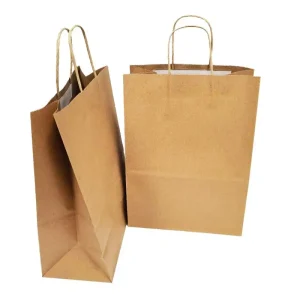Já alguma vez comprou bananas firmes ou abacates duros e se interrogou sobre como acelerar o seu amadurecimento? A solução pode estar num artigo doméstico comum: um saco de papel. Independentemente de quem seja, este conhecimento pode ser um abrir de olhos para todos vós. É a ciência de tudo isto e a explicação da razão pela qual os sacos de papel são sempre preferidos para o processo de amadurecimento natural e inofensivo que será o nosso tópico de hoje.

A ciência: Como os sacos de papel aceleram a maturação
O etileno, uma parte da hormona vegetal natural, é o responsável pelo processo de amadurecimento dos frutos. Agora, à medida que os frutos amadurecem, o etileno é libertado por esses frutos e é isso que provoca uma reação em cadeia, levando assim ao amolecimento, adoçamento do produto e também proporcionando uma boa cor. Eis como um saco de papel desempenha um papel crucial:
Retém o gás etileno: Os sacos de papel permitem apenas uma pequena quantidade de ar para o interior, o que permite que o etileno gasoso se acumule em torno do fruto, e este ambiente com concentração de etileno acelera o processo de amadurecimento, sem ao mesmo tempo dar gás excessivo à humidade do fruto.
Regula a humidade: Os sacos de papel não impedem completamente, e muito menos de forma absoluta, que a humidade fique retida; também não são herméticos. Estes sacos não deixam passar demasiada condensação, que de outra forma provocaria bolor ou pontos moles, e mantêm os frutos contidos secos e frescos.
Protege e amortece: Ao ter pequenos sacos de papel ou sacos de papel castanho Com uma estrutura adequada (também conhecida como "pinch-bottom" ou "SOS design"), que torna o saco resistente, os frutos são protegidos contra as intempéries e podem amadurecer em paz.
Exemplo: Coloque pêssegos verdes num pequeno saco de papel castanho, dobre a parte de cima e deixe o saco à temperatura ambiente. Em 1-2 dias, os pêssegos estarão macios - não são utilizados produtos químicos.
Porquê escolher sacos de papel em vez de sacos de plástico?
Quando pensam em amadurecer a fruta, os utilizadores dão prioridade à segurança, sustentabilidade e eficácia. Eis porque é que os sacos de papel superam os de plástico:
Segurança alimentar em primeiro lugar: A primeira caraterística a ter em conta é o facto de os sacos de papel serem feitos de materiais de qualidade alimentar, o que indica que, por exemplo, os sacos de papel GB/T 27590-2022 estão no topo da lista e que o material está em conformidade com a FDA e a UE. Trata-se de sacos que não contêm produtos químicos perigosos ou compostos que contêm flúor, pelo que o processo de lixiviação não é possível.
Escolha amiga do ambiente: Em seguida, os sacos de papel, em particular, são ecológicos em comparação com os sacos de plástico. Podem ser reciclados e também não representam uma ameaça potencial para a atmosfera da Terra. A proteção do ambiente é a principal preocupação para 80% dos clientes que preferem embalagens sustentáveis, e estes escolherão, sem dúvida, a opção ecológica.
Rentável e versátil: Pode transportar fruta em diferentes quantidades e selecionar a opção de embalagem que mais lhe convém. Mas o mais importante é que pode escolher entre uma gama de opções de ensacamento em papel muito acessíveis, como os sacos de papel pequenos e os sacos de papel castanho grandes.
Escolher o saco de papel certo: Tamanho, material e design
Existe uma grande diferença na qualidade dos sacos de papel. Por conseguinte, deve comprar este tipo de saco de papel:
Material: Opte por sacos de papel kraft castanho, que são duráveis e muitas vezes feitos de materiais reciclados. São ideais para absorver o excesso de humidade sem se rasgarem.
Tamanho: Pequenos sacos de papel são ideais se pretender armazenar pequenas quantidades de, por exemplo, fruta, enquanto os sacos médios serão úteis para artigos a granel.
Caraterísticas de design:
Sacos com fundo plano: Os sacos de fundo plano são mais seguros e evitam que os frutos fiquem amolgados e rolem.
Sacos SOS (abertura automática): São uma forma fácil de abrir um saco rapidamente, uma boa opção quando se está demasiado ocupado na cozinha ou no balcão de venda a retalho."
Revestimentos resistentes a gorduras: A escolha de produtos fabricados com estes revestimentos pode ser benéfica para os frutos que têm uma superfície oleosa. Quanto aos outros frutos, ou estão maduros ou demasiado maduros, antes de poderem ser identificados com estes revestimentos resistentes a gorduras.
Sacos de papel da Nanwang: Concebidos para amadurecer e mais além
Como fabricante líder de sacos de papel de qualidade alimentar, a Nanwang compreende o equilíbrio entre funcionalidade e sustentabilidade. Os nossos produtos:
Cumprem normas de segurança rigorosas: Fabricado em papel certificado para contacto com alimentos, em conformidade com os regulamentos nacionais e internacionais.
Oferecer soluções personalizadas: Desde pequenos sacos de papel castanho para mercearias a encomendas em massa para restaurantes, adaptamos tamanhos, impressões e pegas às suas necessidades.
Prioridade à durabilidade: Os nossos sacos de papel kraft têm fundos reforçados e estruturas robustas, garantindo que não se rasgam mesmo com produtos ligeiramente pesados.
Curiosidade: A Nanwang é uma empresa nacional de elaboração de normas para embalagens de papel em contacto com alimentos, o que significa que os nossos desenhos estabelecem a referência da indústria em termos de segurança e qualidade.
Dicas finais: Dominar o amadurecimento da fruta com sacos de papel
Bem, aqui estão as nossas melhores sugestões:
Pares produtores de etileno: No processo de ter o mesmo saco que os outros, o amadurecimento mais rápido ocorre quando os frutos com emissão de etileno (por exemplo, uma banana, maçãs) partilham o seu saco com frutos de amadurecimento lento (por exemplo, kiwi, manga).
Reutilize os seus sacos: Depois de amadurecerem, os sacos de papel limpos podem ser utilizados como sacos de mercearia, sacos para snacks ou para arrumação ecológica.
Conclusão
Quer dar uma nova dimensão ao amadurecimento dos seus frutos? Um saco de papel de boa qualidade, quer seja utilizado por um cozinheiro doméstico ou por um empresário, pode fazer uma enorme diferença. Nanwang está disponível para contacto para comprar a granel e obter soluções de embalagem de boa qualidade, seguras e ecológicas.





